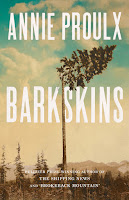 Staff review by Chris Saliba
Staff review by Chris SalibaAnnie Proulx's ambitious new novel is a powerful fictional history of Western dominance and destruction.
Annie Proulx's ambitious new novel, Barkskins, starts in 1693 and finishes in 2013. It chronicles the inexorable European takeover of North America, while interweaving through this history the tragic fate of its indigenous peoples.
Two poor Frenchmen, Rene Sel and Charles Duquet, leave their native Northern France and seek their fortunes in New France, later to be partitioned into Canada and North East America. They work as virtual slaves for a feudal boss, the “seigneur”. In exchange for three years labour, they are promised land of their own. Neither men are treated fairly and their fates vary substantially. Charles Duquet is the more aggressive go-getter. Somewhat reckless and a risk taker, he travels widely and ruthlessly trades his way into business success. Rene Sel, on the other hand, is forced into marriage with a Mi’kmaq Indian woman, a strategy devised by the seigneur as a way to smooth over some tricky local politics.
What follows for the rest of the novel, developed in extraordinary detail over 700 pages, is the histories of the Duquet and Sel lineages. Charles Duquet changes his surname to Duke and his descendents, over many generations, create phenomenal wealth in the logging industry, until the family's fortunes eventually start to wane. As with all great capitalists, the Duke generations have a rapacious hunger for wealth. This hunger and drive seems to bring more headaches than pleasures as they race to maintain their preeminence.
The Sel lineage fares badly, their succeeding generations being of predominantly Indian blood. Their history is one of dispossession, disadvantage and racism. Not only do the Sels lose their lands, but their culture and language are also deeply compromised, as is their traditional knowledge of the forests.
The history of these two lineages covers some 320 years, a complicated family tree bursting with colourful personalities and a fair share of rogues, intertwining the fates of two different peoples, Indigenous and European. Even some of Charles Duke's descendants are part Indian, a fact Duke family business leaders try to hide. Barkskins ends in our our times, with the Sel descendents trying to come to grips with the environmental damage done to their traditional lands.
Barkskins is a remarkable achievement. Written in a muscular, compelling prose, Annie Proulx weaves a complicated history of two families, yet makes her story accessible and engrossing. The main theme of the novel is the clash of two cultures and their relationships and attitudes to the land. Europeans see forests as the natural endowment of intellectually superior whites. They believe they have the wits and ambition to make the land economically productive. The Indigenous peoples have a spiritual and religious relationship to their environment. They know how to use plants as medicine, as a way to heal. The forests give life.
Annie Proulx's genius is to have written a comprehensive fictional history of Western dominance and destruction, of how the West created powerful economies and complex financial systems, but also tore down the world's forests in the process. We learn how Europeans came to see themselves as pre-eminent, God's chosen ones, while the Indian people were held in deep contempt. Through her characters, their ambitions and sorrows, we see how today's economic system, and our current ecological tragedy, has slowly accumulated over 300 years.
It's hard to imagine a better novel you'll read this year.
(Release date 16th June 2016)
Barkskins, by Annie Proulx. Published by 4th Estate. ISBN: 9780008191764 RRP: $32.99
To sign up for our monthly newsletter, featuring new releases, book reviews and favourite articles from around the web, click here.
No comments:
Post a Comment